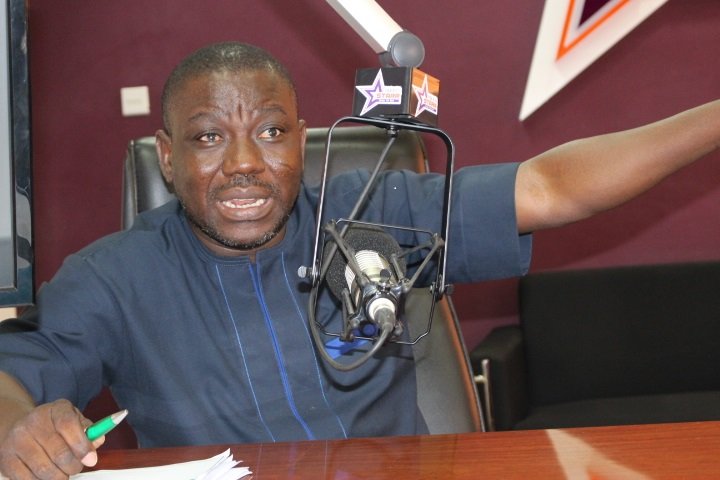
The Member of Parliament for Bolgatanga Central, Isaac Adongo, is holding the governor of the Bank of Ghana Dr. Ernest Addison responsible for collapse of micro finance and micro credit institutions in the country.
The Central Bank last week announced revocation of licenses of 347 micro finance and 39 micro credit institutions over insolvency.
The action, according to the Central bank, is pursuant to section 7 of the Non-Bank Financial Institutions Act, 2008 (Act 774), which mandates the Bank of Ghana to revoke the license of a non-bank financial institution (NBFI) licensed under that Act if that institution among other things ceases to carry on business or ceases to satisfy a qualification under the Act or contravenes any provision of the Act or rules or directives issued by the Bank of Ghana.
Governor of the Bank of Ghana Dr. Addison has always maintained the cleaning up of the financial sector is to protect funds of depositors and sanitize the sector.
But Adongo argues the central bank itself is complicit in the predicaments of the players in the financial sector.
In an interview with Starr News, the Bolgatanga Central MP argues the Central Bank went about cleaning up the sector the wrong way without paying attention to the effects on other players in the sector.
“It’s a very sad development over the period of the reform; I’ve had cause to warn that the conduct of the central bank was essentially going to generate what we have. But what is sad is that for the central bank to have created insolvent financial institutions and to go after them collapsing them is the height of incompetence. Why do I say so? The financial sector is an interrelated, interconnected sector. So it is not one of those sectors where you can isolate one sector, deal with it as though it has no impact on the others. And then when you finish you come and take the other sector and deal with it as if it has no impact on the other until you are finished. It is not a sector that you can do that,” Adongo said.
“The reason is when you act in one sector, because it is an interconnected and interrelated sector and because the financial intermediation process that leads to what happens in the banking sector is a flow of the value chain within the financial sector, you are going to have rippling effects that you have to deal with on an ongoing basis in order that you address the systemic risk to the entire sector.
“And that’s what the Bank of Ghana failed to do. So you take micro finance institutions take money from micro depositors like the market women and the rest, they put some of these monies into investments directly with the banks. They put some of these monies in investments directly with savings and loans companies, with rural banks and with finance houses including investment banks and fund management companies regulated by the Security and exchange commission. These people and in turn also then load these same monies from the micro finance institutions into the banking sector in terms of investments,” he added.
First blow
Mr. Adongo pointed to the revocation of licenses of UT and Capital banks as the first blow which unsettled the sector resulting in the challenges the sector is grappling with today.
“So when you take UT and Capital bank and you resolve it, the first question you ask is what’s the impact of what I’ve just done on the rest of the intermediation process and address that as part of a holistic approach to dealing with the two banks that you have dissolved. But what do we see? You take UT and Capital Banks Fund managements companies that took their monies from micro finance had their monies there, savings and loans companies that took monies from micro finance had their monies there, Rural and community banks that had their monies from micro finance had monies there and the micro finance companies themselves had monies at UT and Capital banks,” the lawmaker stressed.
He added: “Then you decide that your option for addressing the gap is to give them a 10 year bond which doesn’t provide the money, it doesn’t provide cash. Then you compel these institutional financial players to rollover their investments for the next 3 years. So when this happens is that savings and loans companies don’t get their monies, micro finance institutions don’t get their monies that are invested directly at UT and Capital banks and they then also don’t get their monies from the savings and loans, fund management and other companies who put their monies at their 2 banks. The end result is that people go to micro finance companies to take their monies and they don’t also have monies to give them. Then it creates a confidence problem, and then there is a panic withdrawal”.
The minority spokesperson on finance accused the Central bank and the Securities and Exchange Commission of not appraising themselves with the implications of the revocation of the licenses financial institutions of 9 commercial banks. According to him the development has virtually brought the fund management sector to its knees.
“I was shocked yesterday that after the Central bank had announced this, the Securities and Exchange Commission is now writing letters to fund management companies asking them to tell him about the level of interrelated exposures within the sector. You have pressed the panic button. Now you’ve pressed it without even knowing, having a clue and for all these years that you have been doing all these things, you don’t have a clue. You now want to know what it is when you have pressed the panic button”. He argued the action of the central bank in closing down the over 300 micro finance and micro credit institutions will not be necessary if monies owed the affected companies was released. “…And the micro finance institutions have almost 600 million locked up and you’re talking 900 million. So 600 million would have put them on their feet, you needed to make sure that the liquidity is there for them then you can go and start asking questions”.
Licenses of 9 commercial banks were revoked; others were compelled to merge during the clean up exercise leaving only 23 out of 33 banks. President Akufo-Addo has stated the exercise has put the remaining banks in a good standing increasing the liquidity. But Adongo argues otherwise.
According to him, the exercise has not yielded fruits as the President wants the public to believe. He maintains it could have been done differently with minimal negative effects on then sector. Bank of Ghana’s appointed receiver for the insolvent and dormant Microfinance Companies, Mr. Eric Nana Nipah, will however start paying depositors of the 347 insolvent microfinance companies whose claims have been validated and agreed from today.
This follows the release of funds by the government to the Receiver. The Receiver has deployed over 420 personnel across the country to validate and agree claims and to start making payments to depositors whose claims have been validated and agreed, without delay. Payments to depositors will be made at designated branches of CBG, following notifications to these Depositors from the office of the Receiver.
Finance ministry in total has devoted 900 million cedis for the exercise which is expected to move to the Savings and Loan companies next.
Source: Ghana/Starrfm.com.gh/103.5FM/Ibrahim Alhassan




